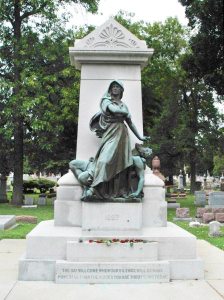 May Day is celebrated in most countries of the world. On May 1st, some countries celebrate the event with fireworks and others use the day to display their military strength and power, but regardless of the way each country commemorates the occasion, it is a day to honor the workers for their services and for the struggles they’ve endured throughout history. This day is a holiday for 71% of the world, or 157 countries out of 222 that have chosen to celebrate this day in honor of the Haymarket Affair Martyrs.
May Day is celebrated in most countries of the world. On May 1st, some countries celebrate the event with fireworks and others use the day to display their military strength and power, but regardless of the way each country commemorates the occasion, it is a day to honor the workers for their services and for the struggles they’ve endured throughout history. This day is a holiday for 71% of the world, or 157 countries out of 222 that have chosen to celebrate this day in honor of the Haymarket Affair Martyrs.
Today, when Republicans are so desperately trying to take us back to the same working environment those men fought against so bravely we should pay homage to the history of the real International Labor Day. We should remember the tribulations the American Worker has endured, the sacrifices those before us made in order for us to enjoy what we have and why today’s bureaucrats are generously buying Congress to return us to the time before 1886.
In May 3, 1886 there were some striking workers congregated at the McCormick Reaper Works when the Chicago police interrupted the peaceful assembly by firing into the unarmed crowd, killing and injuring many of the men present. This event provoked the labor leaders to organize a meeting at the Haymarket Square, an open public place, where they condemned the acts perpetrated by the Chicago police against workers and where they asked those present to intensify their protests demanding an eight-hour workday and better working environment. Mayor Carter Harrison attended this meeting and asked police not to intervene. Noticing that this congregation had begun to disperse and that the speeches and atmosphere of the meeting was considerable milder than previous ones, Mayor Harrison decided to go home, it was about an hour after his departure that the police, who had been only a few blocks away and who had spies in the crowd, decided to interrupt that meeting lead by Captain William Ward and Inspector John Bonfield. No one knows for certain what prompted them to do this when the meeting was about to end. While the Chicago police was dispersing the crowd someone threw a dynamite bomb to where the police was, killing one policeman immediately and injuring others. Gunshots were exchanged and at the end there were seven police officers dead; no one knows how many workers were injured or killed, that’s how unimportant they were at the time.
In reality no one knew for certain who threw that bomb but the sinister event prompted, a couple of days later, for the police to round up every known or suspected radical in the city. It has been said that the State’s Attorney, Julius Grinnell, ordered to “make the raids first and look up the law afterward.” The police conducted searches and arrests without any warrants and no one but the accused seemed to have a problem with the tactic. There were several arrests, but at the end only eight would stand trial for the bombing, seven of the eight accused had been speakers at the Haymarket meeting.
The first arrested were Michael Schwab (33), August Spies (31) and Adolph Fischer (28). The arrest of Samuel Fielden (39), George Engel (50), Louis Lingg (21) and Oscar Neebe (36) came later. Albert Parsons (38) left the city urged by his friends and his wife, Lucy Parsons. The police also arrested and released Rudolph Schnaubelt (23), Schwab’s brother-in-law, but later the police thought that he was probably the bomb-thrower and went after him for his arrest but by the time they’ve done this, Schnaubelt had left the country never to be seen again.
Albert Parsons wasn’t caught by the police, he surrendered. I guess he truly thought that he was going to have a fair trial and believed there was no evidence against him, and in reality there was none. However, the trial was a mockery from the get go. State’s Attorney Grinnell made sure that every single person picked to serve as jurors saw these men as criminals and were on the side of the police, every worker that had picketed and called to serve were dismissed as biased.
Grinnell called as witnesses two individuals: Malvern Thompson and Harry Gilmer. Thompson claimed that he had heard Spies and Schwab talk about the bomb before the meeting started, and Gilmer said under oath that he had witnessed Spies light the bomb and Schnaubelt throw it into the police. It did not matter that there were witnesses claiming that Spies never left the wagon, that Schnaubelt had left the event before the sinister took place, that Schwab didn’t even went to the event or that all of these men were German and spoke among themselves in their native tongue, which neither Thompson nor Gilmer understood. The defense noted all the disparities, however Grinnell maintained these to be true and, even if they weren’t, and he maintained that these men had incited the bomb to be thrown. In other words, it didn’t matter that they did not had, lit, touched or thrown the bomb; what mattered was that because they were the speakers they were to be blamed.
It did not matter that the evidence presented by Grinnell was faulty, it mattered even less that the case did not prove that any of the men on trial had thrown the bomb or had been involved in planning it. All of that didn’t matter because Grinnell maintained that it was the words and actions of these men (inciting workers to demand 8-hour workdays and better working environment) that had provoked it and therefore they were accessories to the crime; he went as far as to accuse these men of treason and murder.
The defense argued that the accused only interest was for a better society. Moses Salomon, their defense attorney, referred to his clients in his closing argument as “men of broad feelings of humanity” and “that their only desire has been, and their lives have been consecrated to, the betterment of their fellow-men.” According to the Chicago History Museum, the lead attorney, Black, compared them to Jesus Christ, “the greatest Socialist of Judea.” That remark infuriated Grinnell and Judge Gary, who instructed the jury to dismiss most of the case presented by the defense. The jury deliberated for just a few hours and found seven of the eight defendants guilty of murder and sentenced to death and Oscar Neebe, of conspiracy and sentenced to fifteen years of hard labor.
The accused were given the opportunity to speak before the sentence would be pronounced. They all did, beginning with Spies, then Schwab, Neebe, Fischer, LIngg, Engel, Fielden and last was Parsons. Parsons spoke for eight hours spread in two days. All the defendants had used a portion of the time they were given to speak on a personal level, Louis Lingg used the time to make his last plea for anarchy and to openly express his disgust towards the system and it has been said that Lingg blamed the system for the “universal misery, the ravages of the capitalist hyena,” he closed his speech by telling the prosecutors, judge and those that had sentenced him: “I despise your order, your laws, your force-propped authority. Hang me for it!”
Judge Gary was more than happy to oblige and sentenced Neebe to the State Penitentiary and the rest of the defendants to be hanged by two o’clock on December 3 of the following year.
Out of the seven sentenced to death, Samuel Fielden and Michael Schwab had their sentences commuted to life in prison – but Parsons, Engel, Spies and Fischer were hanged on that November 11, 1887, around 10 AM. All of them gave a declaration while standing on the scaffold. Spies shouted “The time will come when our silence will be more powerful than the voices you are throttling today,” Spies died without knowing how prophetic his words were. Fischer and Engle both said “Hooray for Anarchy” and Fischer boldly added, “This is the happiest moment in my life!” I am sure that as an act of defiance against those that thought they had won over him. Parsons asked for an opportunity to speak before being shut forever, he said out lout to his jailer “Let me speak, Sheriff Matson! Let the voice of the people be heard!” but as he paused to breathe, the trap fell and his voice was silenced forever.
Louis Lingg, the youngest of the anarchists, was not among those hanged on November 11th, because according to the records of the time, he killed himself the day before. On November 10th around 9:00 AM, twenty-three year old Louis Lingg placed a blasting cap in his mouth, lit it up and blew his lower jaw off along with most of his face. He was in agony for six long hours until he expired around 3:00 PM on the same day. Most historians believe he committed suicide, others believe he was going to use the blasting cap to scape, after all it was only four days before his death that his jailers confiscated 4 bombs from his cell and which we can only assume he had created them to escape.
A short month after the four executed anarchists were buried, supporters began immediately to plan for the erection of a monument, and in December of 1887 the Pioneer Aid and Support Association was founded to raise funds for this project and to assist relatives of the deceased. On June 25, 1893, the son of Albert and Lucy Parsons, fourteen-year-old Albert Parsons, Jr., unveiled the hooded figure of justice and liberty facing the future resolutely as she places a laurel wreath on the brow of a fallen worker. The monument was the creation of sculptor Albert Weinert.
In 1893, Oglesby's successor, John Peter Altgeld, acknowledged that these men had been unjustly tried and that no convincing evidence was presented against them and therefore he pardoned the surviving defendants, Fielden, Schwab, and Neebe. This decision cost him his political career but I guess that he placed more value on justice than politics.
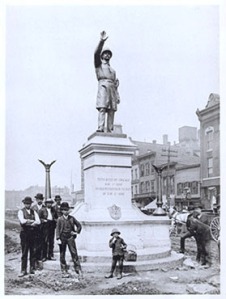 In United States, the Haymarket Affair was just a moment in the history of Chicago and the American labor movement. A monument to the police officers who lost their lives in the Haymarket confrontation was erected at the Haymarket Square, even though it is believed that the police were the ones that provoked the riot.
In United States, the Haymarket Affair was just a moment in the history of Chicago and the American labor movement. A monument to the police officers who lost their lives in the Haymarket confrontation was erected at the Haymarket Square, even though it is believed that the police were the ones that provoked the riot.
To this day I can’t comprehend why we - who have benefited so much from what these men demanded then and for which four of them lost their lives - do not honor their memory by celebrating the American Worker on May 1st and instead it is observed on the first Monday in September for no apparent reason.
The eight-hour workday did not become a reality until 1938 when then President Roosevelt signed the Fair Labor Standards Act, which established a 40 hour workweek with overtime payment for additional hours worked.
Following are links to the famous speeches of the eight Chicago anarchists in court when asked if they had anything to say why sentence should not be passed upon them. Click on each picture to follow the link.

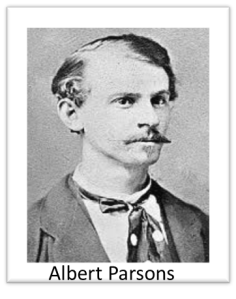
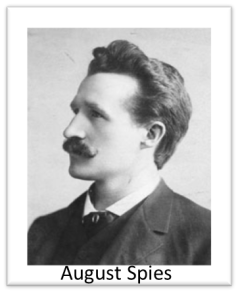
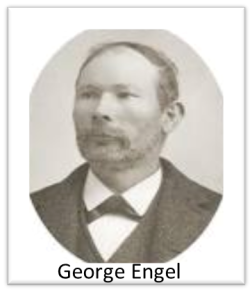
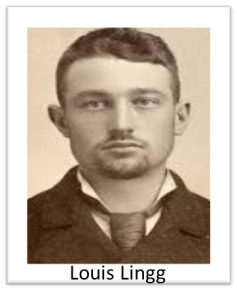
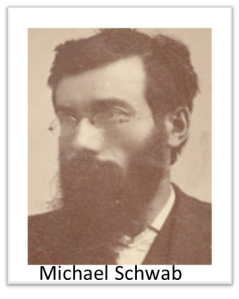
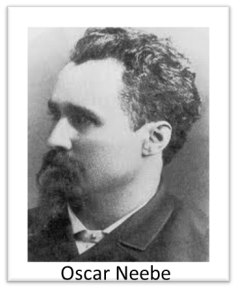
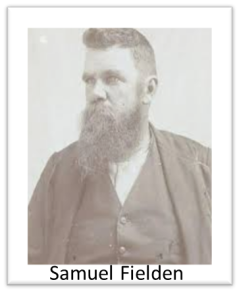
No comments:
Post a Comment